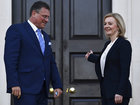Europe's natural gas crisis isn't letting up. Reserves are low. Prices are high. Utility customers are facing expensive bills. Major Russian supplier Gazprom isn't selling gas like it used to.
It all raises the question: How exactly is Europe, which imports most of its energy, going to make it through the winter without a gas disaster, especially if the season turns out to be colder or longer than usual?
 Full Story
Full Story
U.K. Foreign Secretary Liz Truss called for Britain and the European Union to rebuild their relationship, as she and bloc's top Brexit official met Thursday for talks on a thorny dispute over Northern Ireland trade.
Truss and European Commission Vice President Maros Sefcovic were meeting at Chevening House, the foreign secretary's official country retreat in southeast England.
 Full Story
Full Story
India and Britain on Thursday launched talks on a free trade deal that is expected to boost bilateral trade by billions of dollars in one of the most ambitious negotiations after Brexit.
Britain's International Trade Secretary Anne-Marie Trevelyan met with Piyush Goyal, India's minister of commerce and industry, in New Delhi before formal talks next week.
 Full Story
Full Story
The Gaza Strip has few jobs, little electricity and almost no natural resources. But after four bruising wars with Israel in just over a decade, it has lots of rubble.
Local businesses are now finding ways to cash in on the chunks of smashed concrete, bricks and debris left behind by years of conflict. In a territory suffering from a chronic shortage of construction materials, a bustling recycling industry has sprouted up, providing income to a lucky few but raising concerns that the refurbished rubble is substandard and unsafe.
 Full Story
Full Story
The head of the International Energy Agency blamed Russia for worsening Europe's natural gas crisis, saying Wednesday that high prices and low storage levels largely stem from the behavior of state-owned gas supplier Gazprom.
Russia could send up to a third more gas through existing pipelines, said Fatih Birol, executive director of the Paris-based 30-member organization that provides policy recommendations on affordable and sustainable energy. That would amount to some 10% of European daily consumption — about what industry officials say would be needed to avoid a severe shortage in case of colder-than-expected weather.
 Full Story
Full Story
Global stocks and Wall Street futures advanced Wednesday after Federal Reserve chairman Jerome Powell said U.S. monetary policy would return to normal and interest rates might be raised earlier than planned.
London and Frankfurt opened higher. Shanghai, Tokyo and Sydney advanced.
 Full Story
Full Story
U.S. airlines say China has blocked more than a dozen recent and future flights from entering the country, which has been tightening already-strict COVID-19 travel restrictions.
China ordered the cancellations after some passengers tested positive for COVID-19 on flights that arrived in China in late December, according to industry officials.
 Full Story
Full Story
A federal judge has ruled that the Federal Trade Commission's revised antitrust suit against Meta, formerly known as Facebook, can proceed, shutting down the social media company's request for a dismissal.
In a revised complaint filed last August, the FTC argues that the company pursued a "buy or bury" strategy against rivals to suppress competition.
 Full Story
Full Story
Benjamin Whitely headed to a Safeway supermarket in Washington D.C. to grab some items for dinner. But he was disappointed to find the vegetable bins barren and a sparse selection of turkey, chicken and milk.
"Seems like I missed out on everything," Whitely, 67, said. "I'm going to have to hunt around for stuff now."
 Full Story
Full Story
Central Bank Governor Riad Salameh has said that banks are now allowed to unlimitedly buy U.S. dollars from the central bank in Lebanese pounds at the price specified by the Sayrafa platform.
“In addition to the monthly quota that the banks are withdrawing in USD, the banks now have the right to buy dollar banknotes from the BDL with the LBP currency that they and their customers possess, without a ceiling,” Salameh said.
 Full Story
Full Story



